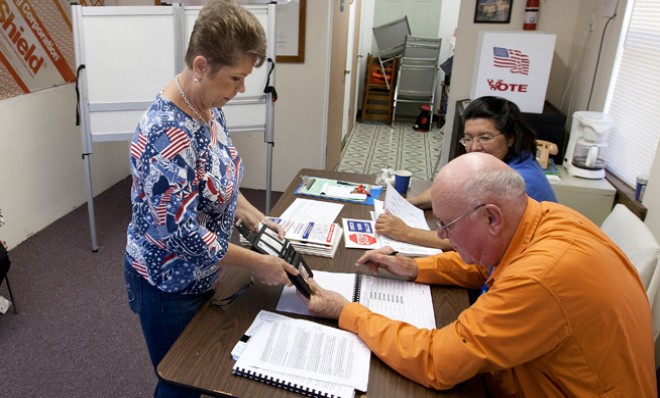How the Supreme Court struck a huge blow to voter registration laws
In the latest fight over voter registration, the justices invalidate an Arizona proof-of-citizenship requirement


A free daily email with the biggest news stories of the day – and the best features from TheWeek.com
You are now subscribed
Your newsletter sign-up was successful
The Supreme Court on Monday struck down an Arizona law requiring residents to prove their citizenship when registering to vote in federal elections, thus handing a significant victory to opponents of a slew of state-level voting restrictions that have cropped up in recent years.
The ruling effectively prohibits states from unilaterally throwing up roadblocks to voter registration. Republicans have championed such efforts in the last few election cycles as being necessary to thwart voter fraud, though Democrats have blasted them as transparent attempts to keep poor and minority citizens from voting.
In a 7-2 split, the court ruled that federal law superseded Arizona's authority to impose additional restrictions beyond what the federal government requires. The federal law in question, the National Voter Registration Act of 1993, only asks voters to answer whether or not they're citizens. Arizona's law, passed by voter initiative in 2004, went further, mandating that prospective voters first provide birth certificates or other documentation verifying their citizenship.
The Week
Escape your echo chamber. Get the facts behind the news, plus analysis from multiple perspectives.

Sign up for The Week's Free Newsletters
From our morning news briefing to a weekly Good News Newsletter, get the best of The Week delivered directly to your inbox.
From our morning news briefing to a weekly Good News Newsletter, get the best of The Week delivered directly to your inbox.
Writing for the majority, Justice Antonin Scalia said the federal law "precludes Arizona from requiring a federal form applicant to submit information beyond that required by the form itself." He added that the federal law requires states to "accept and use" the federal registration forms because those forms would otherwise "[cease] to perform any meaningful function, and would be a feeble means" of accomplishing their goal of registering voters.
The ruling affirms a U.S. 9th Circuit Court of Appeals opinion last year that blocked Arizona's law.
Arizona has sparred with branches of the federal government before, most notably over immigration issues. Last June, the Supreme Court struck down most of a controversial Arizona law that gave police broad authority to detain suspected illegal immigrants.
The latest ruling also directly affected four other states — Alabama, Georgia, Kansas, and Tennessee — that have similar laws to Arizona's proof-of-citizenship provision. Some 12 other states were also considering similar legislation, though they'll likely be deterred from those efforts now.
A free daily email with the biggest news stories of the day – and the best features from TheWeek.com
"Today's decision sends a strong message that states cannot block their citizens from registering to vote by superimposing burdensome paperwork requirements on top of federal law," said Nina Perales, vice president of litigation for the Mexican American Legal Defense and Educational Fund, which brought the first suit against Arizona's law back in 2006.
However, the ruling does not mean states have no power to seek to impose additional hurdles to voter registration. Scalia specifically noted in his opinion that Arizona could ask the Election Assistance Commission to change its requirements, or challenge the existing requirements in court.
That assurance gave both sides in the voter restriction debate "encouragement, but perhaps rather confusing legal guidance," said SCOTUSBlog's Lyle Denniston. While the ruling for now struck down Arizona's law, it left open the possibility for states to pursue similar laws through other means, he said.
The opinion seemed to leave little doubt that, if Arizona or another state went to court to try to establish such a constitutional power, it might well get a very sympathetic hearing, because that part of the Scalia opinion laid a very heavy stress on the power of states under the Constitution to decide who gets to vote. Indeed, that part of the opinion said that the Constitution simply does not give Congress the power to decide who can qualify, but only how federal elections are run procedurally.
It will be up to lower courts — and election-law specialists — to sort out just how to reconcile the two parts of the court’s majority opinion. And it appears there may well be quite a few opportunities to do so, because of the rising number of efforts — particularly in states in which Republicans have control of state governments — to impose new voter ID and other restrictions on the right to vote. [SCOTUSblog]
Jon Terbush is an associate editor at TheWeek.com covering politics, sports, and other things he finds interesting. He has previously written for Talking Points Memo, Raw Story, and Business Insider.
